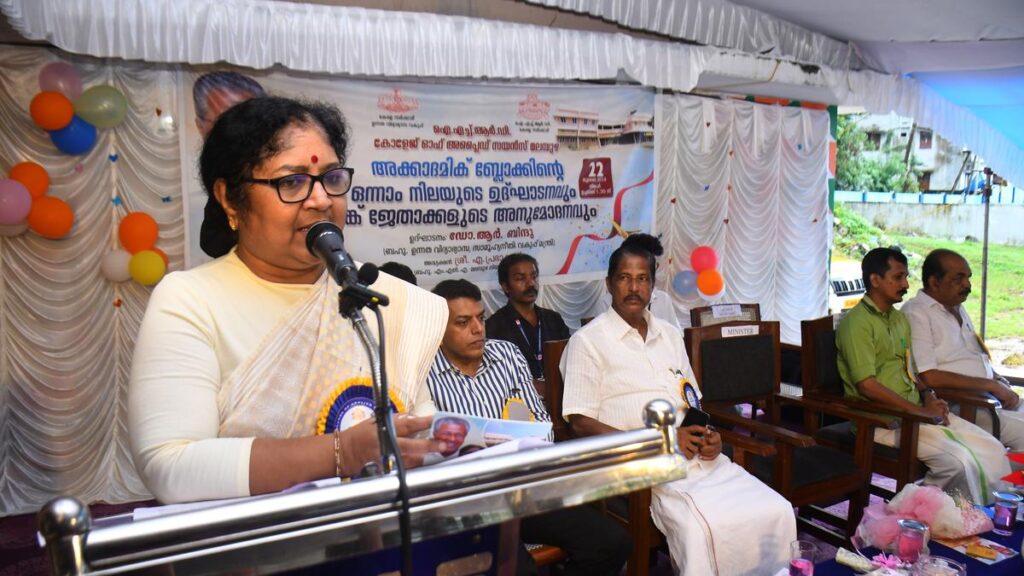
Kerala Education Minister R Bindu
| Photo Credit: K.K. Mustafah
The State government has sought politically bipartisan support to mobilise public opinion against the Central government’s “anti-federal and authoritarian” draft University Grants Commission (UGC) regulations.
Replying to questions in the Assembly on Thursday, Higher Education Minister R. Bindu said the Left Democratic Front (LDF) government would hold a National Education Convention (NEC) in Thiruvananthapuram on February 20.
Also Read | Centralising control: On the Draft UGC Regulations, 2025
She said the NEC would provide a collaborative platform for ministers of [non-Bharathiya Janata Party (BJP)] State governments to voice their concerns about the contentious UGC draft regulations, which Ms Bindu said infringed on federalist principles by seeking to wrest the control of State-funded varsities from the jurisdiction of provincial governments.
Ms Bindu, the convention would host legislators from concerned States, academicians, representatives of student and teacher organisations, opinion leaders, writers, intellectuals and other stakeholders opposed to the UGC’s proposals, which undermined the autonomy of State-funded varsities. The Sankara Narayanan Thampi memorial hall in the Legislative Assembly complex would host the national conference.
Ms Bindu pointed out that the Centre aimed to transform UGC directives’ “recommendatory” nature into “inviolable laws”.
She pointed out that the Centre’s contribution to the state’s higher education sector was negligible.
In contrast, in the past fiscal alone, Kerala invested Rs 1,800 crores in higher education, resulting in smart classrooms, state-of-the-art labs, modernised libraries, and upgraded student hostels.
Ms Bindu said the Centre’s bid to saffronise higher education manifested in the move to cut back on fellowships for minorities, including the famed Maulana Azad Endowment.
However, the Kerala government had cushioned the impact of the Centre’s arbitrary action by funding post-doctoral fellowships, including the Nava Kerala Fellowships.
The government has raised public concerns regarding the UGC draft regulations in several letters to the Union Minister of Education, Dharmendra Pradhan, but to no avail.
The government based the communications on the preliminary findings of the Prabath Patnaik committee studying the socio-political fallout of the UGC’s proposals.
Ms. Bindu stated that the Central government aimed to insert Rashtriya Swayamsevak Sangh (RSS) allies in top university positions, including vice-chancellor, by proposing to eliminate the criteria of academic excellence for such appointments.
Ms. Bindu said the draft UGC regulations specify a ‘ten years public experience’ standard in any field as the “ambiguous yardstick” for appointing vice-chancellors of state-funded universities.
The UGC’s proposed benchmark for future vice-chancellor appointments does not bode well for the country’s diverse, multiethnic, pluralistic, multilingual, and tiered social structure.
Ms. Bindu said the Centre hoped to abolish affirmative action for marginalised groups in the higher education sector. The UGC draft regulations aim to end minority rights in higher education institutions.
Law Minister P Rajeeve said the draft UGC regulations were prima facie “ultra vires”. The UGC had acted beyond its legal power and authority by proposing that scholarliness and academic excellence were no longer benchmarks for appointing teachers and vice-chancellors in State varsities. He said the UGC draft regulations sought to undermine the Constitutionally mandated control of State universities by provincial governments.
Published – February 13, 2025 01:06 pm IST

